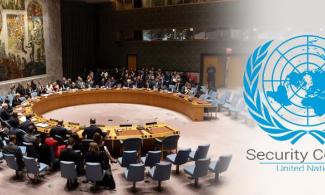
The proposal also aims to improve ties with Pacific Islands nations, which are seen as pivotal in countering growing Chinese influence in the region.
The United States is advocating for the addition of two permanent seats for African nations on the United Nations Security Council and one rotating seat for small island developing states.
However, the proposal will be unveiled by U.S. Ambassador to the U.N., Linda Thomas-Greenfield, on Thursday.
The development marks a strategic effort by the U.S. to strengthen its relationships with African countries, many of which have expressed dissatisfaction with Washington's stance on Israel's ongoing conflict in Gaza.
The proposal also aims to improve ties with Pacific Islands nations, which are seen as pivotal in countering growing Chinese influence in the region.
Reuters reports that Thomas-Greenfield hopes the announcement will "advance the agenda in a way that could lead to Security Council reform in the future," framing it as part of U.S. President Joe Biden's legacy.
The proposal includes adding two permanent African seats and a rotating seat for small island developing states, alongside Washington's long-standing support for permanent seats for India, Japan, and Germany.
Developing nations have long called for permanent seats on the Security Council, the UN's most powerful body.
However, years of discussions have yielded no results, and it remains uncertain if U.S. backing will catalyze action.
Before the announcement at the Council on Foreign Relations in New York on Thursday, Thomas-Greenfield clarified to Reuters that Washington does not support expanding veto power beyond the five existing permanent members.
The Security Council is responsible for maintaining international peace and security and can impose sanctions, arms embargoes, and authorize military action.
When the UN was established in 1945, the Security Council had 11 members. This expanded to 15 members in 1965, including 10 elected states serving two-year terms and five permanent veto-wielding nations: Russia, China, France, the U.S., and Britain.
U.N. Secretary-General Antonio Guterres supports Security Council reform.
"The Security Council reflects the post-World War II situation... it faces issues of legitimacy and effectiveness, and needs reform," he told Reuters on Wednesday.